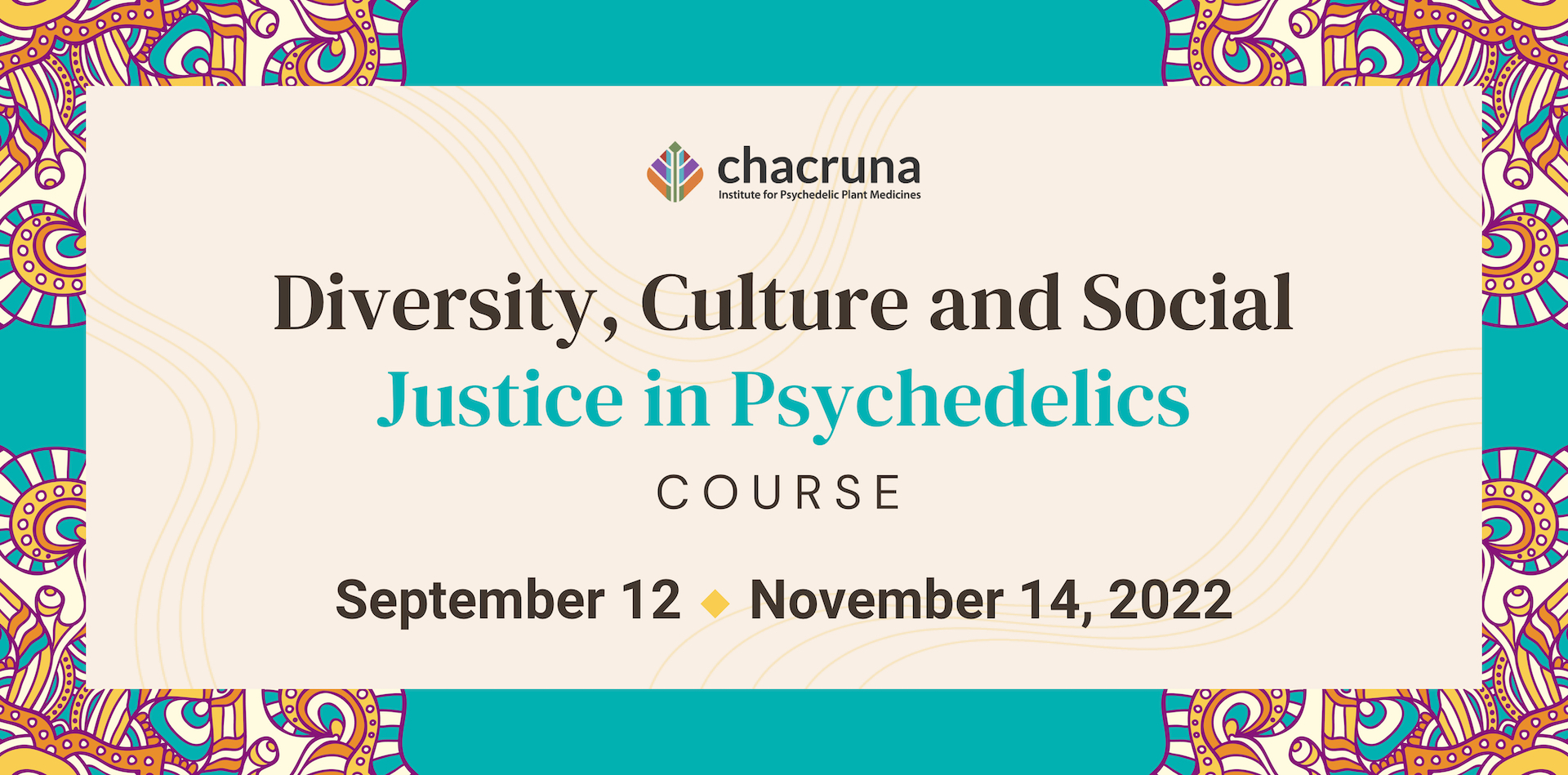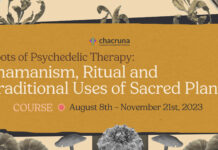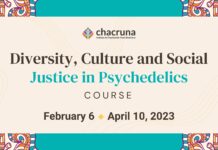September 12th – November 14th, 10am-12pm PST/1pm-3pm EST
Price $450 USD
Price $280 for CE credits
This course, taught by leading experts and the first of its kind in the psychedelic field, will teach students to consider the cultural, social, historical, and economic context that influences the so-called “psychedelic renaissance.” Students will be introduced to basic concepts around psychedelics and justice, diversity, equity, and inclusion (JEDI). The goal of the course is to explore the ways in which psychedelics influence and are influenced by factors such as social justice, privilege, and diversity and to better understand their reciprocal influences on psychedelic science, therapies, and praxis. Topics include: anti-racism, implicit bias, queer aspects, intersectionality, cultural humility, social identity, power and privilege, healing the racial divide, uses of Indigenous plant medicines, and challenges around their mainstreaming and globalization. This course is intended to be intellectual, personal, and experiential. We will examine structural issues that act as systemic barriers to JEDI efforts. Students will also be challenged to think critically and confront aspects of themselves, their beliefs, behaviors, and needed areas of growth, such as their individual, familial, and group legacies of privilege and disadvantage, their personal commitments to social justice, advocacy, and social change in the psychedelic community and the world more broadly. These perspectives are crucial for deepening our understanding of the expanding future of psychedelic medicine in ways that are equitable and just.
To read more on our recording policy for our trainings and answers to other frequently asked questions, please view our FAQ.
Learning Objectives
At the end of the program, participants will be better able to…
- Analyze how crime and drug policies impact minoritized peoples in the US
- List and explain terms frequently used in the study of race/ethnicity
- Analyze how racism impacts the mental health of people of color
- Explain the potential for psychedelics to relieve racial stress and trauma
- Discuss intersectionality theory and praxis
- Discuss the importance of intersectional cultural humility in psychedelic-assisted therapy and research
- Discuss dynamics of power and privilege through a somatic, healing-centered and trauma-informed lens
- Describe types of power and the embodied experiences of working across power differentials
- Discuss the history of psychedelic treatment of gay people in psychedelic therapies designed to alter their sexual or gender identities
- Analyze the current challenges sexual and gender minorities may face when seeking psychedelic therapy
- Explain core issues surrounding the mainstreaming and globalization of psychedelics and the way they affect marginalized groups
- List ways in which non-indigenous folks can honor indigenous knowledge and practices and give back to indigenous communities
Information on Continuing Education Credits for Health Professionals
- CE credits for psychologists are provided by the Spiritual Competency Academy (SCA) which is co-sponsoring this program. The Spiritual Competency Academy is approved by the American Psychological Association to sponsor continuing education for psychologists. Spiritual Competency Academy maintains responsibility for this program and its content.
- The California Board of Behavioral Sciences accepts CE credits for LCSW, LPCC, LEP, and LMFT license renewal for programs offered by approved sponsors of CE by the American Psychological Association.
- LCSW, LPCC, LEP, and LMFTs, and other mental health professionals from states other than California need to check with their state licensing board as to whether or not they accept programs offered by approved sponsors of CE by the American Psychological Association.
- SCA is approved by the California Board of Registered Nursing (BRN Provider CEP16887) for licensed nurses in California. RNs must retain their certificate of attendance for 4 years after the course concludes.
- For questions about receiving your Certificate of Attendance, contact [email protected]
- For questions about CE, contact Spiritual Competency Academy at [email protected].
CE Credit Requirements
- Student must be in attendance with their camera on for the entirety of the class session
- Student must be actively participating in the class session (asking questions, contributing to discussion, etc.)
- Student must fill out an evaluation and assessment form at the end of the course, which will be provided by Chacruna
- Collective CE credits will be awarded at the end of the course given that all of the above requirements are met
*please note that you must purchase a ticket for CE credits on Eventbrite in order to receive CE credits
*please note that if you miss a class, you will not be awarded CE credits for that session and cannot be refunded for the CE cost
*please note that the first and last class do not count towards CE credits
Chacruna Certificate Requirements
At the end of the course, students will have the option to receive a certificate from Chacruna for the completion of this course. In order to receive this certificate, students must complete one of the following options:
A. Submit a final individual paper of 1,800 to 2,000 words, following Chacruna’s Chronicles Guidelines (the best papers will be selected to be published on the Chacruna site)
B. Submit a final group paper consisting of 2,000 words per person (i.e. if there are two people writing the paper, it should be a total of 4,000 words; if there are three people writing the paper, it should be a total of 6,000 words)
C. Submit a paper with internal reflection of what you have learned throughout this course
D. Pitch another specific proposal to submit (i.e. mini-documentary, video lecture, creation of a podcast.)
E. Students will have the option to do an art project related to the contents of the course F. Students will have the option to conduct a “Family History.” This would consist of the student interviewing their family members to contextualize their life and experience, to understand their roots, and also talk about their local community/ lands/ social environment where they came from and/or are located
*Students will also have the option to opt out of receiving the certificate
Classes
Click on the class to read the description
Class One – Introduction
Monday, September 12th @10-12am PST/1-3pm EST
Professors: Dr. Bia Labate, Dr. Monnica Williams and Dr. NiCole Buchanan
In this initial class, students will introduce themselves to others in the course, be introduced to the professors and their backgrounds, and gain an understanding of the curriculum and program. Students will leave with preparation for the following classes being taught and a general understanding of the topics that will be discussed throughout the course.
Class Two – Psychedelics, bias and the-isms
Monday, September 19th @10-12am PST/1-3pm EST
Professor: Dr. NiCole T. Buchanan
There is a widespread belief among those within the psychedelic community that, once ingested, psychedelic substances connect us to all living creatures, and this interconnectedness negates the potential for bigotry and bias. Therefore, as a result of these effects, the psychedelic community is welcoming, inclusive, and devoid of the -isms (racism, classism, heterosexism, etc.). In this class we will define bias, microaggressions, and structural oppressions (the -isms), then we will explore how they manifest in psychedelic science and practice.
Class Three – The Importance of Cultural Competency and Anti-Racist Education for Psychedelic Assisted Therapy: Understanding Aversive Racism and the Power of Identity
Monday, September 26th @10-12am PST/1-3pm EST
Professor: Dr. Sonya Faber
Participants utilizing psychedelic assisted therapy are in a position of increased vulnerability because it strips people of their normal psychological protections while they also endure immobilization until effects of the psychedelic substances abate. For BIPOC, psychological protections used to navigate interracial interactions are compromised and therefore, therapy paradigms not centered in understanding the experience and needs of BIPOC people puts them at additional risk of harm. Facilitators must unpack their own implicit biases before they can administer these therapies to BIPOC. Multiple studies have shown that people exhibit greater empathy to individuals with a similar skin color and the current situation is that in the USA, Canada, and Europe, most psychedelic therapists are White, and as such most clients of color will be seeing a White therapist. Therefore, it is important to shine a light on cultural competency and implicit bias. There are ways to improve cultural competency; racially based sensitivity to others’ pain can move from implicit to explicit if made salient. Being a culturally competent therapist requires a better understanding of the tools of systemic racism. Understanding aversive racism and how it develops is a first important step. This class will focus on key issues including aversive racism and the power of Identity.
Class Four – Queer Aspects of Psychedelic Experience
Monday, October 3rd @10-12am PST/1-3pm EST
Professor: Dr. Alex Belser
Thisclass will explore the dimension of gender-diverse people and sexual orientation in the context of psychedelics. Psychedelics have been used by LGBTQA+ communities for many years as part of the creative source and self-therapy practiced among cultural outcastes. We will look at how queer people have used psychedelics to build community and explore identity. This class will also examine a dark period when psychedelics were used to treat homosexuality (“conversion therapy”) in clinics internationally, sometimes in aversive therapy scenarios. We will look at the ways psychedelic therapy can be made more accessible to gender- and sexually-diverse people, and the ways that queer people might be accommodated and treated with more understanding. Participants will become familiar with the particular needs of the queer population in regard to treatment, their struggle to have aspects of gender and orientation respected in clinical contexts with psychedelics, and the ways psychedelics can help resolve some of the trauma of being queer in a homophobic society.
Class Five – Intersectionality & Cultural Humility in Psychedelics
Monday, October 17th @10-12am PST/1-3pm EST
Professor: Dr. NiCole T. Buchanan
Psychological science, the psychedelic community, society, and individuals have been slow to incorporate intersectionality as a concept and as a framework for conducting research and informing healing practices. This reality limits our understanding of how intersectionality impacts our daily lives and our practices as psychedelic practitioners and scholars. In this class, we will review intersectional theory and praxis broadly. We will examine the role of intersectional cultural humility in psychedelic-assisted therapy and identify how to fully incorporate intersectional social justice in psychedelic science and practice.
Class Six – Psychedelics and Racial Justice: Equity and Access
Monday, October 24th @10-12am PST/1-3pm EST
Professor: Monnica Williams, Ph.D.
Psychedelics have been studied for the treatment of numerous mental health conditions, as an avenue for personal growth, and for enhancing well-being. However, psychedelic research studies have largely excluded people of color, leaving important questions unaddressed for these populations. Additionally, the War on Drugs has created racial barriers to access and estrangement from many psychedelic communities, even as decriminalization is expanding. Dr. Williams will discuss the impact of first-wave drug research abuses, social policies, and stereotypes on communities of color. She will discuss ethnic minority mental health, and how psychedelic therapies may help or hinder healing for racialized individuals. Also discussed are next steps in ensuring that access to culturally-informed care is prioritized, including the importance of culturally-informed approaches and training experiences of psychedelic therapists of color, as several psychedelics move into late phase trials and expanded access.
Class Seven – Critical Perspectives on Contemporary Uses of Indigenous Plant Medicines
Monday, October 31st @10-12am PST/1-3pm EST
Professor: Dr. Bia Labate
This class will first offer an overview of traditional and contemporary uses of ayahuasca in the Amazon, peyote in Mexico and the US, and psilocybin mushrooms in Mexico. This will include contemplating cross-cultural concepts such as plant spirits, relationship to non-humans, and healing as a holistic affair. We will next address the main challenges related to the current globalization, commodification, and mainstreaming of psychedelic plant medicines. We will examine topic such as colonization, tourism, cultural appropriation, regulation, and conservation, including anthropological and Indigenous perspectives. Initiatives by the psychedelic movement to celebrate the traditional “wisdom holders,” to acknowledge the historical context of plant medicines, and attempts to include Indigenous voices in conferences, as well as emergent discourses around the need to financially compensate Indigenous people, are often permeated by cultural misunderstandings of what constitutes healing, traditional knowledge, and the plants themselves. While some in the psychedelic movement claim that plant medicines improve their health, cure the planet, and fiercely advocate for “cognitive freedom” and decriminalization, Indigenous people continue to be exploited, oppressed and murdered across the Americas. There continues to be a lack of support for Indigenous resistance to their systematic oppression, the support of land rights, ecological restoration, healthcare, anti-discrimination, food security, intellectual property, and so forth. What’s more, the globalization and commodification of psychedelics is fast becoming complicit with the economic forces at the root of these problems. We hope this class will help to better frame questions around authenticity, Indigeneity, and commercialization of Indigenous knowledge and sacred medicines.
Class Eight – Understanding Racial and Ethnic Minorities and the Role of Entheogens in Healing the Racial Divide
Monday, November 7th @10-12am PST/1-3pm EST
Professor: Dr. Darron Smith
The class will examine the economic and political conditions in US society that give rise to the development and persistence of systemic racism and other forms of oppression that stigmatized minorities (Black, Indigenous and people of color) face in virtually every domain from educational policy to health care equity. Race still matters. Participants will learn the historical origins of white racial ideologies and how those concepts saturate the imagination of most Americans (whether or not they realize it) while familiarizing themselves with basic sociological theory. This course is intended to give students a broad understanding of race relations in society and how psychedelic (i.e., MDMA, psilocybin, DMT, ayahuasca) might be helpful to heal the racial divide. As such, the fundamental objective of this course is to learn concepts germane to study of racial/ethnic relations in the US.
Class Nine – Conclusion
Monday, November 14th @10-12am PST/1-3pm EST
Professors: Dr. Bia Labate and Dr. Monnica Williams
In this final class, we will strive to summarize everything taught throughout the course. In doing so, we will recap the main concepts, highlight the main moments, and give folks a chance to voice any significant takeaways about the topics discussed. We will also do a critique of the course and think of ways to improve it for future teachings.
Professors
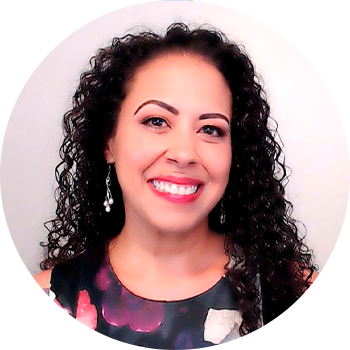
Dr. NiCole T. Buchanan, Ph.D., is Professor of Psychology at Michigan State University and Clinical Director and Founder of Alliance Psychological Associates, PLLC. She serves on the inaugural Board of Directors of the American Psychedelic Practitioners Association and the Board of Directors and the Racial Equity and Access Committee for the Chacruna Institute for Psychedelic Plant Medicine. Dr. Buchanan has trained with MAPS’ MDMA-assisted therapy, the CIIS’ Certificate for Psychedelic Research and Therapy, and the Polaris Insight Center’s Ketamine-Assisted Psychotherapy training. She is a fellow of the Association for Psychological Science, four separate divisions of the American Psychological Association, and has received numerous national and international awards for her research, teaching, clinical work, and professional service. She is an accomplished speaker, writer, and scholar, with more than one hundred journal articles, book chapters, and research reports focusing on diversity, equity, and inclusion, workplace behaviors and their impact on organizational climate, employee well-being, and professional development. Her work has been highlighted in hundreds of media outlets including CBS News, the Huffington Post, and Essence Magazine and she has been a featured speaker for several programs including TEDx and National Public Radio (NPR).
Dr. Sonya Faber graduated with a Masters in Neurobiology from Brown University after completing her undergraduate work at the University of Pennsylvania. She continued her graduate studies at New York University earning a PhD in molecular genetics with a thesis concentration in signal transduction. Over the course of the last 15 years, she has had the opportunity and privilege to contribute equally to both academic research institutes and commercial pharmaceutical development. She has worked in clinical operations for companies including, IQVIA, Covance and Sanofi-Aventis. Her interests lie in in creating innovative solutions for projects which could benefit both patients and the scientific community, in part by connecting with top scientists, industry and regulatory agencies.In her academic roles, she assessed novel ideas and supported scientists in making these commercially viable while contributing to several original grants and research papers and patents. Her interest in protocol design, medical writing and project management, which she utilized in both pharma and biotech firms, included pre-clinical and clinical activities for phase II and III trials across multiple indications. She has a special interest in training the next generation of clinical researchers and has designed courses to teaching scientific writing and Good Clinical Practice. Dr. Faber is member of the Board Directors of the Chacruna Institute for Psychedelic Plant Medicines.Her engagement on thisBoard is on a volunteer basis and is based on her personal interest in the science of psychedelics, which has long been an interest of hers before taking her current position at Syneos Health.
Dr. Alex Belser has been a leader in the psychedelic research community for the last twenty years, having served as an investigator on clinical trials of psilocybin and MDMA to treat depression, anxiety, substance use, OCD, PTSD, and end-of-life distress. Dr. Belser is a psychologist and Co-Investigator at Yale University. He serves as the Chief Clinical Officer of Cybin where he leads their clinical programs in psychedelic therapeutics. He is also part of Chacruna Institute’s Women, Gender Diversity, and Sexual Minorities Working Group. Dr. Belser previously served as Chief Clinical Officer at Adelia Therapeutics, where he directed the clinical program investigating tryptamines and phenethylamines for a variety of treatment indications. Dr. Belser has authored over a dozen peer-reviewed journal articles and chapters. He worked as a therapist on studies of MDMA-assisted psychotherapy for the treatment of severe PTSD. Dr. Belser studied at Georgetown University, the University of Cambridge, Columbia University, New York University, and Yale University. Dr. Belser trained at Bellevue Hospital, Mount Sinai Beth Israel Hospital, and New York Psychiatric Institute at Columbia University. See more here http://alexbelser.com and here http://centerforbreakthroughs.com.
Dr. Monnica T. Williams is a clinical psychologist and Associate Professor at the University of Ottawa, in the School of Psychology, where she is the Canada Research Chair in Mental Health Disparities. She is also Clinical Director of the Behavioral Wellness Clinic. Her research focuses on African American mental health, culture, and psychopathology, and she has published over 100 scientific articles on these topics. Current projects include the assessment of race-based trauma, unacceptable thoughts in OCD, improving cultural competence in the delivery of mental health care services, and interventions to reduce racism. She gives diversity trainings nationally for clinical psychology programs, scientific conferences, and community organizations. She currently is Chair of their Academic Training & Education Standards (ATES). She is also a member of the Scientific Advisory Board of the International OCD Foundation, and co-founded their Diversity Council. Dr. Williams is a member of Chacruna’s Racial Equity and Access Committee.
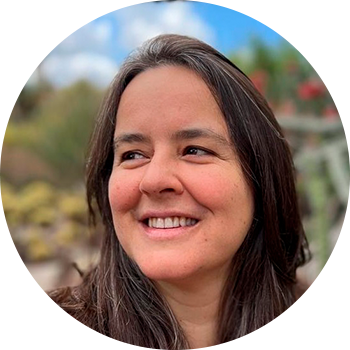
Dr. Beatriz Caiuby Labate (Bia Labate) is a queer Brazilian anthropologist based in San Francisco. She has a Ph.D. in social anthropology from the State University of Campinas (UNICAMP), Brazil. Her main areas of interest are the study of plant medicines, drug policy, shamanism, ritual, religion, and social justice. She is Executive Director of the Chacruna Institute for Psychedelic Plant Medicines (https://chacruna.net, https://chacruna-iri.org, https://chacruna-la.org). She serves as Public Education and Culture Specialist at the Multidisciplinary Association for Psychedelic Studies (MAPS), and Adjunct Faculty at the East-West Psychology Program at the California Institute of Integral Studies (CIIS). She is also a member of the Oregon Psilocybin Advisory Board’s Research Subcommittee, and Diversity, Culture, and Ethics Advisor at the Synthesis Institute. Additionally, she is a co-founder of the Interdisciplinary Group for Psychoactive Studies (NEIP) in Brazil and editor of its site. She is author, co-author, and co-editor of 24 books, two special-edition journals, and several peer-reviewed articles (https://bialabate.net).
Dr. Darron T. Smith is a NCCPA-certified physician assistant and faculty member in the department of sociology at the University of Memphis. His areas of research and scholarship examine US-based systems of racial oppression and systemic inequality found in all domains across society, including healthcare, the family (transracial adoption), healthcare disparities, religion, sport, culture, and politics. Dr. Smith’s current research and practice intertwine the study of neurosociology, race-based trauma, and mental illness by looking at the impact of neurofeedback versus MDMA-assisted psychotherapy on brainwave activity in individuals with racial trauma (PTSD) using EEG technology. He is featured in the CBS Sports documentary, The Black 14: Wyoming Football 1969, as well as the Loki Mulholland film on transracial adoption, Black, White & Us: Love is Not Enough. He is the author of When Race, Religion & Sports Collide: Black Athletes at BYU and Beyond. Dr. Smith is a member of Chacruna’s Racial Equity and Access Committee and board member of the American Psychedelic Practitioners Association.
Take a minute to browse our stock:
Did you enjoy reading this article?
Please support Chacruna's work by donating to us. We are an independent organization and we offer free education and advocacy for psychedelic plant medicines. We are a team of dedicated volunteers!
Can you help Chacruna advance cultural understanding around these substances?










